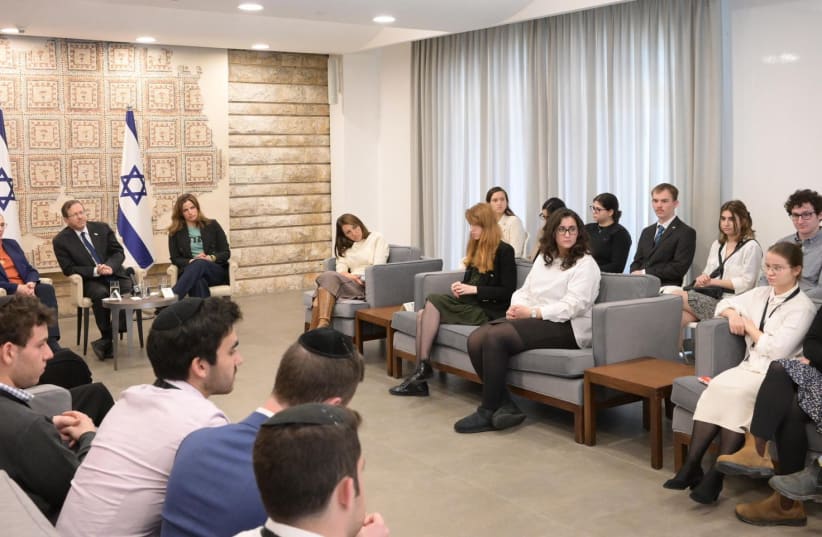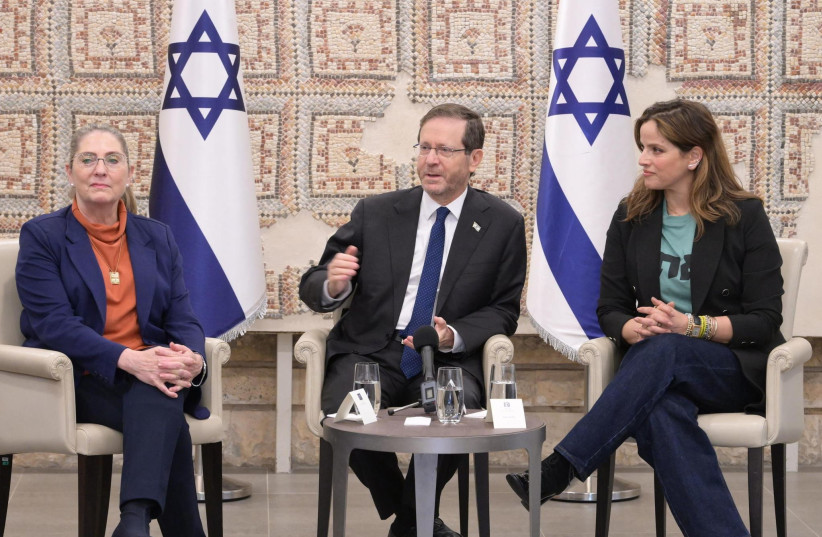“You are the frontier in a very important battle,” President Isaac Herzog told a solidarity delegation of Jewish student leaders from North American universities on Thursday.Although the president has young American university alumni on his staff, he was interested in getting a broader picture of antisemitic and anti-Zionist incidents on North American university campuses.The students were brought to Israel in a joint effort under the auspices of New York-based Hasbara Fellowships.
The purpose of the independent NGO is to bring student leaders to Israel for advocacy training so that when faced with antisemitism or anti-Zionism on campus, they will know how to respond, Hasbara Fellowships Executive Director Alan Levine told The Jerusalem Post.The students usually spend 16 days in Israel. But this time, because it was a solidarity visit rather than an advocacy training visit, they came for seven days.The battle on US college campuses
“There are a lot of hostilities on the campuses,” but also a lot of victories, Levine said. “It’s a hostile environment, but it’s not a battle that we can’t win.”Coming to Israel with a solidarity delegation, he told Herzog, is sending a message of solidarity to Israel and a message to university campuses: “When we get back to the US, we won’t be afraid.”On its arrival in Israel, the delegation was greeted by Likud MK Danny Danon, who, as Israel’s immediate past ambassador to the United Nations, used to bring groups of ambassadors from New York to Israel for them to understand that the anti-Israel rhetoric they heard at the UN was not true.Among the universities represented are Penn State University, Massachusetts Institute of Technology, Cornell, Columbia, Brandeis, Temple, John Hopkins, University of Illinois, Hofstra, University of Washington, University of Pittsburgh, University of California, Santa Barbara, University at Albany, and McGill.Some of the remarks made by students indicated total indifference by fellow students, both Jewish and non-Jewish; ignorance on the part of people who attack Israel, courage on the part of some Jewish students in the face of large pro-Palestinian rallies, and fear by other students.Herzog was particularly interested in knowing if students had faced personal harassment and how they reacted.Mostly, they had stood their ground, they said.Some complained of verbal attacks and incitement but not of physical violence. Others complained that it was the administration that had adopted an anti-Israel stance.The problem with MIT is that it is an open campus, and anyone can come in, one student said.A Washington student said there was a local Palestinian organization, and there was a lot of harassment from anti-Zionists.There are a lot more Palestinian students than Jewish students, a Johns Hopkins student said, adding that a student who is a cousin of one of the hostages was given a bad time by Palestinian students.Jewish students at the University of California have been reduced to tears by epithets hurled at them by pro-Palestinian students. At Columbia, protest rallies on both sides are becoming more heated.Amanie Rachel Levy of the University of Illinois said busloads of Arabs come to Skokie, Illinois, where there is a large Jewish population, make defamatory remarks about Jews, and sometimes hold violent demonstrations. Several years ago, Skokie was notorious for its neo-Nazi rallies, she said, but today, it is notorious for its pro-Palestinian rallies.Skokie is very problematic, Levy said, adding: “It used to be famous because of the Nazis. Now, it’s the same with different people.”Benjamin Himmel of Penn State University said since he was in eighth grade, he had been told: “They’re going to hate you for being Jewish. They’re going to hate you for being a Zionist,” so he was already prepared. But it didn’t happen because at Penn State, most students are not politically oriented; their minds are on other issues. So, when Palestinian students burst into a classroom chanting their slogans, no one paid attention, he said.Also attending the meeting were Michal Herzog, the wife of the president, and Noa Tishby, a Los Angeles-based Israeli anti-propaganda activist, actress, producer, fashion model, and author.Michal Herzog, who has been running a vigorous campaign for recognition by the United Nations of sexual and physical abuse by Hamas of captive females, has received considerable support.
Disclosing that there have been certain changes in the statement by UN Women on the situation in Israel and Gaza, Herzog said it was a small step but a forward step. She urged the students to continue the conversation with detractors of Jews or Israel – “because you never know who’s listening.”Tishby said anti-Zionism is an expression of antisemitism because Israel is a Jewish state with an indigenous culture and religion with traditions that stem back to the Bible and are practiced by Jews in all the countries in which they live.As for anti-Zionists, she advised the students to look at them through the prism of Jewish history. Over the centuries, many people have tried to eliminate the Jews. They failed and disappeared, but the Jews are still here, she said.When this is pointed out to antisemites, they sometimes pause and think, Tishby added.

